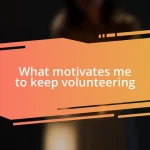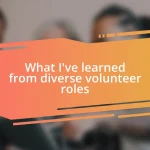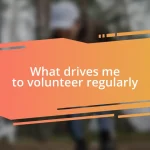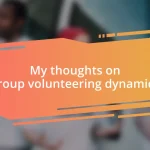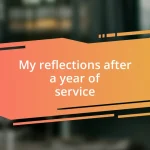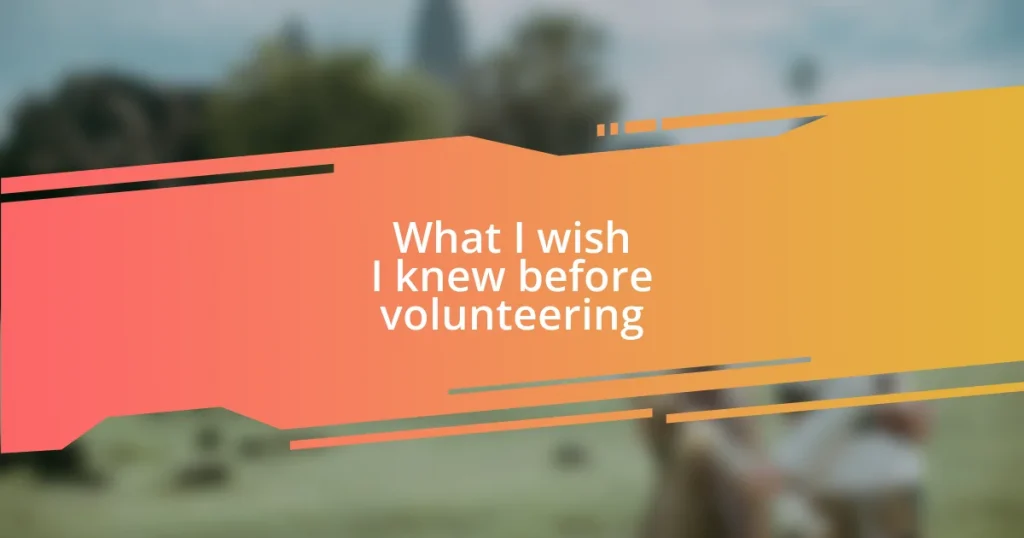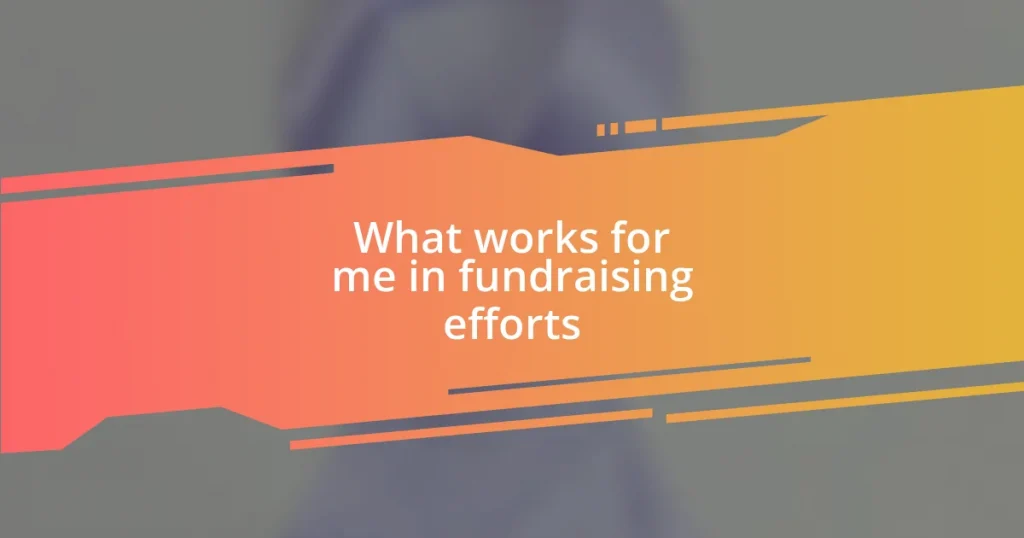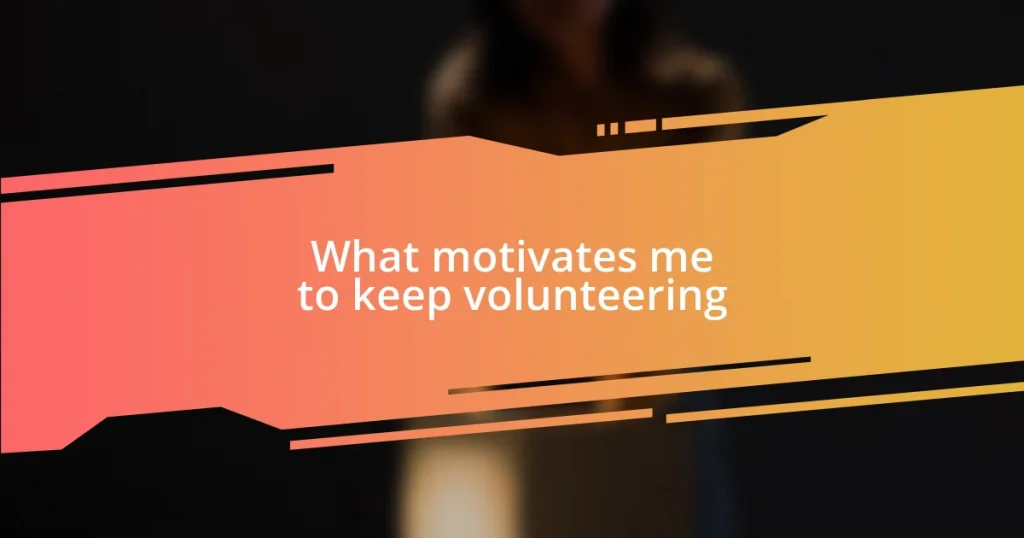Key takeaways:
- Open communication with coordinators and understanding roles can enhance the volunteering experience and prevent disillusionment.
- Assessing personal skills and interests before volunteering helps in finding positions that are both fulfilling and beneficial to the organization.
- Reflecting on experiences after volunteering promotes deeper understanding and connection to the cause, making the journey more meaningful.
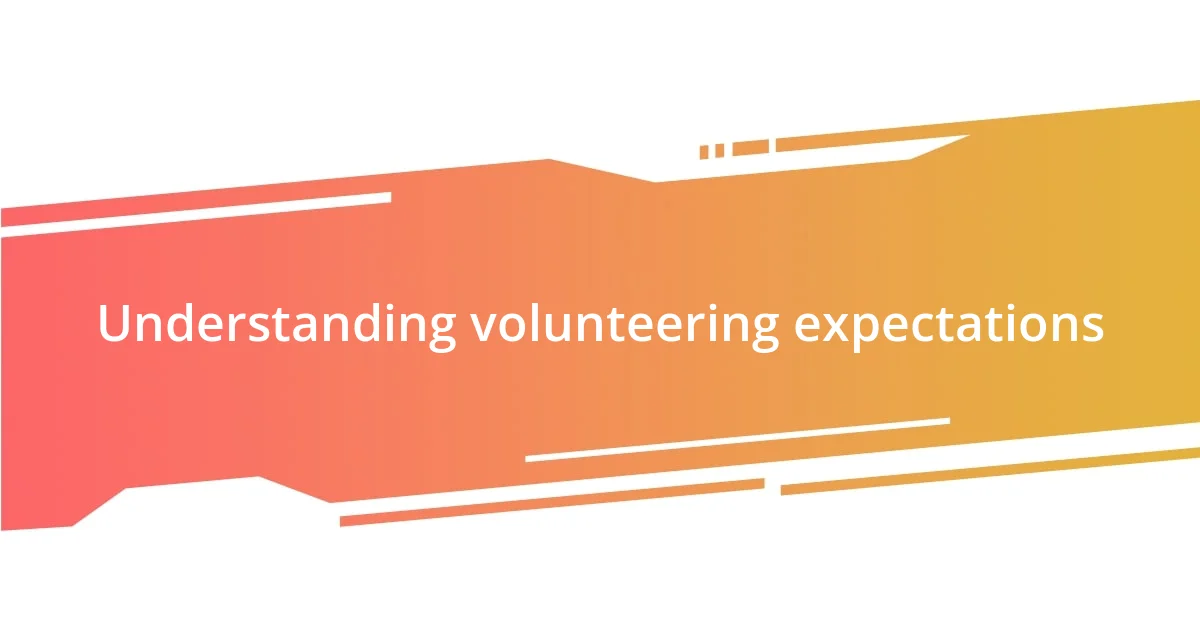
Understanding volunteering expectations
When I first volunteered, I walked in with a heart full of hope and a mind buzzing with anticipation. I learned the hard way that expectations can differ vastly between volunteers and organizations. Have you ever felt that disconnect between what you think you’ll be doing and what you end up doing? It can be disheartening if you aren’t clear on what’s expected from you.
One important point that I discovered is the necessity of having open communication with your coordinators. I remember my first day when I thought I would be engaging directly with the community, only to find myself organizing materials behind the scenes. While organizing was critical, it wasn’t what I had envisioned. So, don’t hesitate to ask questions before diving in; clarity will lead to a more fulfilling experience.
Additionally, I realized that volunteering often requires flexibility and adaptability. There were times when I felt overwhelmed by sudden changes, such as a shift in my role due to an unexpected shortage of volunteers. Instead of resisting these changes, embracing them actually enriched my experience and helped me develop new skills. How do you think being adaptable might enhance your volunteering journey?
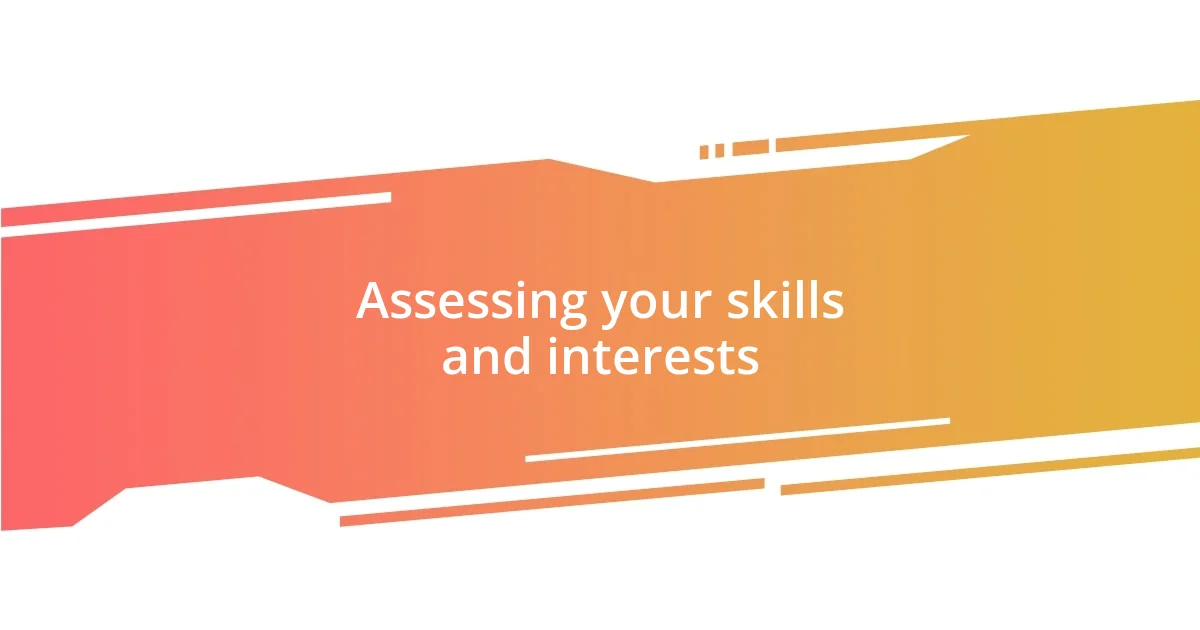
Assessing your skills and interests
Before volunteering, it’s essential to take a moment to assess your skills and interests. I often reflect on my own strengths and passions, which plays a significant role in finding a position that suits me best. For instance, I realized that my knack for communication made me a valuable asset in roles that involved interacting with people directly. Have you thought about what you excel at? This reflection can guide you toward the opportunities that will not only benefit the organization but also make your experience enjoyable.
Identifying your interests is just as crucial. I’ve learned that aligning your volunteer work with what excites you leads to a more engaging experience. During my time volunteering at a local animal shelter, my love for animals made every moment fulfilling. Conversely, I’ve also taken roles that didn’t resonate with me, and I could feel my enthusiasm wane quickly. How can you ensure that your next volunteering experience ignites passion rather than frustration?
Creating a skills and interests comparison can help clarify where you can best contribute. By mapping out what you can offer against what you love, you can navigate your volunteer journey more confidently. Reflecting on both aspects gave me a clearer road map and helped me make choices that aligned with my values and abilities.
| Skills | Interests |
|---|---|
| Communication | Animal Welfare |
| Organizational Skills | Community Service |
| Creative Problem Solving | Environmental Conservation |
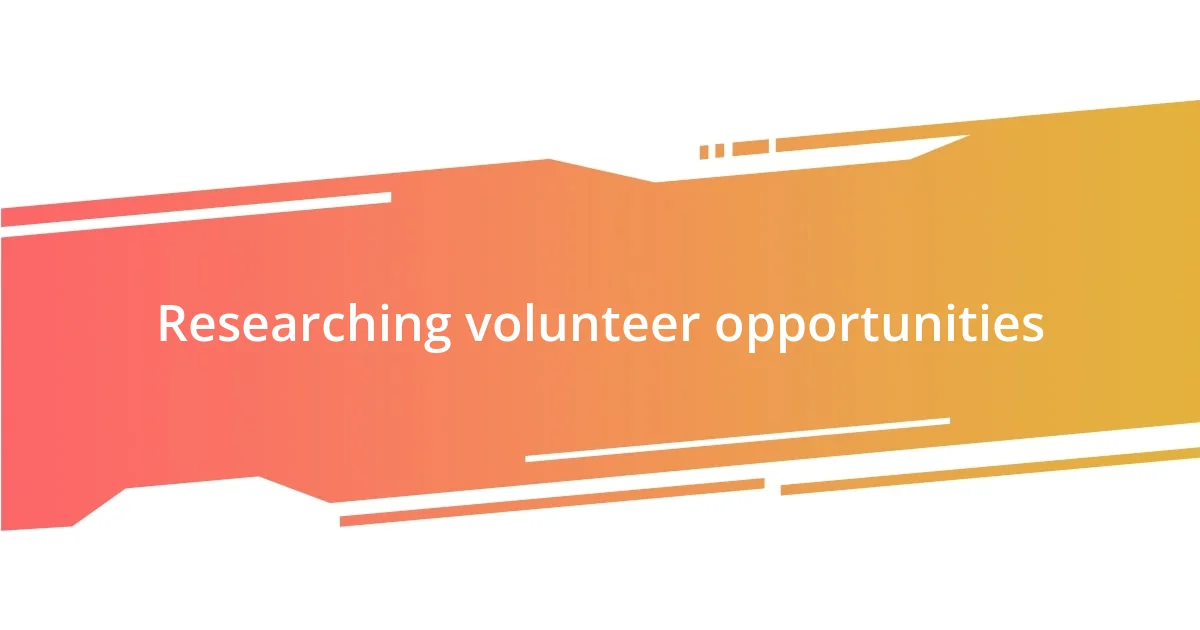
Researching volunteer opportunities

Diving into research for volunteer opportunities was one of the most eye-opening experiences for me. Initially, I assumed all organizations had similar values and mission statements, but soon realized the diversity in approaches and environments. I vividly remember scrolling through countless listings, feeling both excited and overwhelmed. It’s crucial to look beyond the surface and investigate the organizations thoroughly. I often found myself digging into their social media, reading reviews from past volunteers, and even reaching out to current ones to get a sense of what truly happens on the ground. It’s like peeling an onion—there’s always more than the outer layer.
Here are some factors I found essential during my research:
– Mission Alignment: Ensure the organization’s goals resonate with your values.
– Volunteer Reviews: Look for first-hand accounts of experiences to gauge their authenticity.
– Commitment Requirements: Be clear on what’s expected regarding time and dedication.
– Training Opportunities: Check if they offer training; this can enhance your skills and the overall experience.
– Community Impact: Understand the tangible impact the organization has within the community—it adds to your motivation.
While I was exploring, I also learned that not all opportunities are created equal; context matters. For example, I thought I’d love working at a large organization with robust programming, but my heart preferred the intimate setting of a small community project. During one of my placements, I thought I’d be overwhelmed by the larger crowd—but I didn’t connect. Instead, I thrived in a smaller environment where I could witness the immediate impact of my contributions. It’s essential to consider how the organization’s size and goals align with your preferences. Remember, the right fit can significantly enhance the joy and fulfillment you derive from your volunteer work.
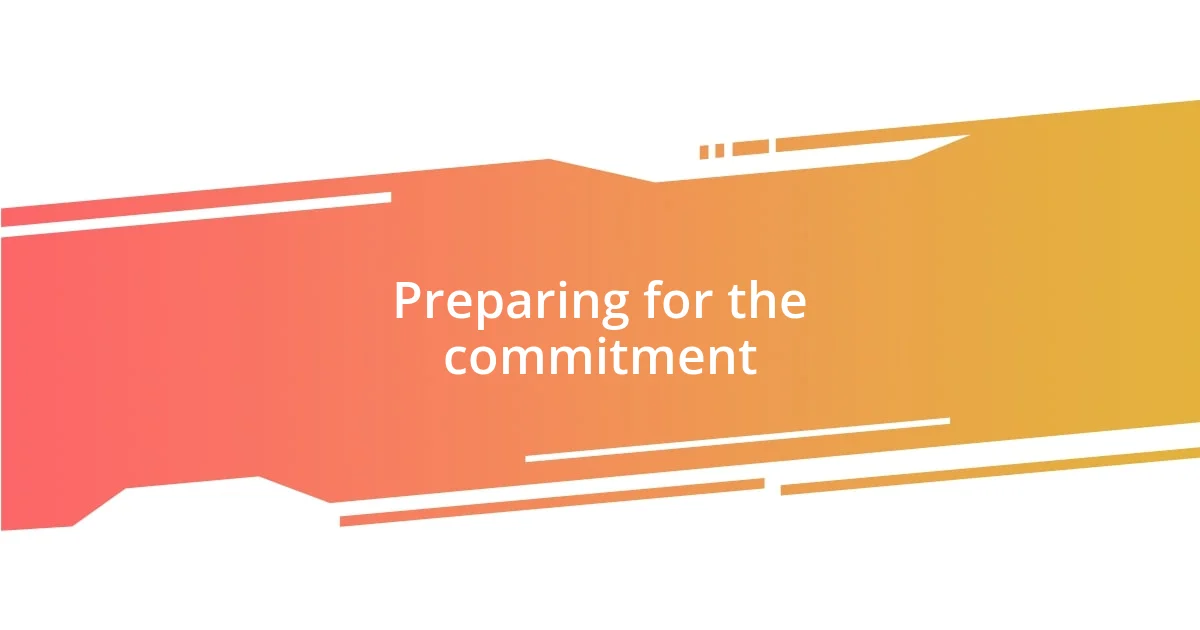
Preparing for the commitment
It’s something I wish I had realized sooner—preparing for a volunteer commitment is a crucial step that can significantly impact your experience. I remember the first time I signed up for a project without fully understanding the time dedication it required. I ended up feeling overwhelmed and unable to contribute effectively. Have you ever found yourself in a situation where you overcommitted? Taking the time to clearly define your availability and the energy you can commit beforehand makes a remarkable difference in how you feel about your involvement.
Reaching out to the organization to ask questions before you begin also played a pivotal role in my volunteer journey. For instance, when I decided to help at a community garden, I didn’t just want to know about my tasks; I wanted to understand the team dynamics and the culture of the organization. This conversation helped me gauge whether their environment matched my expectations. Have you ever felt uncertain about the volunteer culture? Understanding this aspect can foster a sense of belonging and motivation once you’re on board.
Lastly, preparing emotionally is something I realized is often overlooked. I once volunteered in a shelter that dealt with difficult cases, and although I was passionate, I wasn’t ready for the emotional toll it took. I now encourage others to consider not just the practical commitments, but also how they might emotionally process the experiences they’ll encounter. After all, are we really prepared for the challenges that volunteering may bring? Taking an honest look at your emotional readiness can set you up for a more meaningful and sustainable experience.
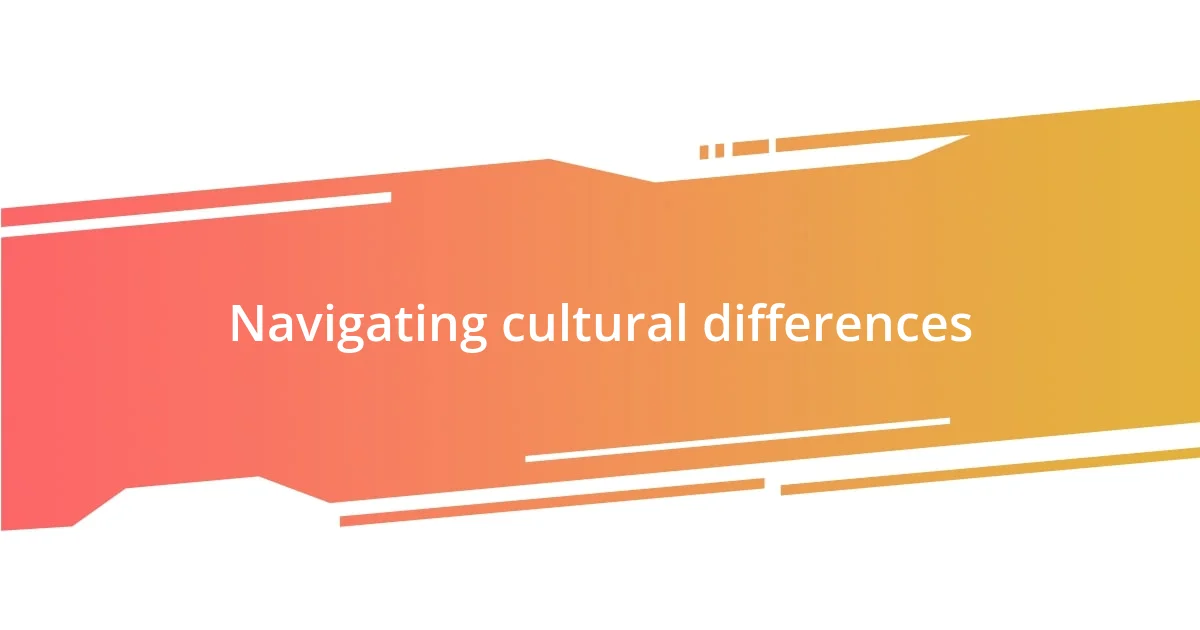
Navigating cultural differences
Cultural differences can truly shape your volunteer experience, often in ways you might not expect. I remember my first project in a foreign country; I felt out of my depth as I navigated local customs and communication styles. For instance, the way I approached discussions or offered suggestions was received quite differently than I anticipated, leaving me to wonder if I was really making a positive impact. Have you ever felt misunderstandings ripple through your interactions? It’s a learning curve that can be both humbling and enlightening.
Understanding the nuances of cultural norms is essential for building respectful relationships. I once volunteered with a group from a vastly different background than mine. At first, it was tough to break the ice. Then I realized that being open about my curiosity and asking questions about their traditions sparked genuine connections. Asking questions not only broadened my perspective but also invited them to share their experiences. Isn’t it fascinating how a simple inquiry can bridge gaps? This taught me that embracing cultural differences enriches the volunteering experience, turning potential stumbling blocks into stepping stones for learning.
Engaging with cultural differences can sometimes stir up discomfort, as I learned from organizing a community event where conflicting cultural expectations arose. I remember grappling with the tension when my approach clashed with traditional practices. It pushed me to reflect on my privilege and recognize the importance of patience and adaptability. I found that fostering an inclusive environment required me to step back and listen, fostering dialogue instead of imposing my views. Have you ever had to confront your own biases? These moments taught me invaluable lessons about empathy and the joy of diverse perspectives, ultimately transforming my volunteering approach.
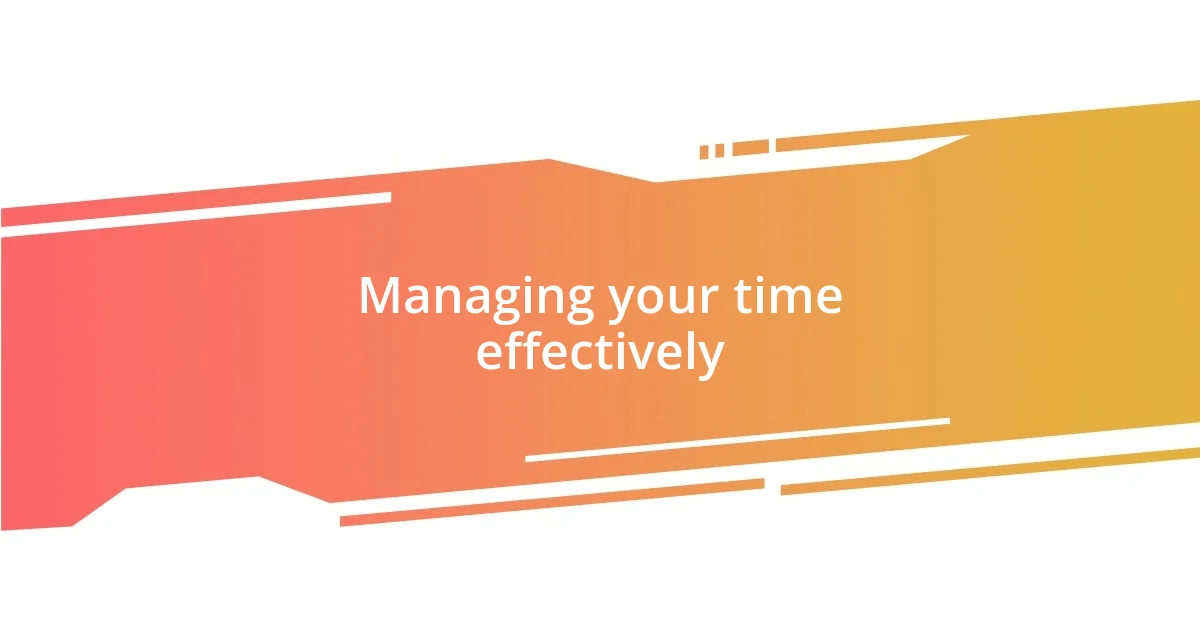
Managing your time effectively
Managing your time effectively is often a key factor in making your volunteering experience fulfilling. I distinctly remember a time when I signed up for a weekend project, only to find it clashed with existing commitments I had. The struggle to balance everything left me feeling frustrated and drained. Have you ever been in a similar situation? Learning to prioritize and managing my calendar more thoughtfully has been transformative for me.
It’s essential to schedule your volunteer hours alongside your regular responsibilities. One method I found particularly useful is the time-blocking technique, where I allocate specific periods in my week exclusively for volunteering. I even color-code my calendar, which makes it visually easier to see where my time goes. Do you think that would work for you? Seeing this structure has helped me keep my commitment more manageable, ensuring that I show up ready to contribute.
Lastly, I discovered that setting aside reflection time after each volunteering session significantly enhanced my engagement. Initially, I would dive straight into my next task without considering what I had just experienced. By taking a few minutes to jot down my feelings or insights after each session, I connected more deeply with my work. Have you considered how a little reflection could enrich your volunteering journey? This practice not only made me more mindful but also allowed me to appreciate the significance of my contributions, creating a more profound emotional connection with the cause.
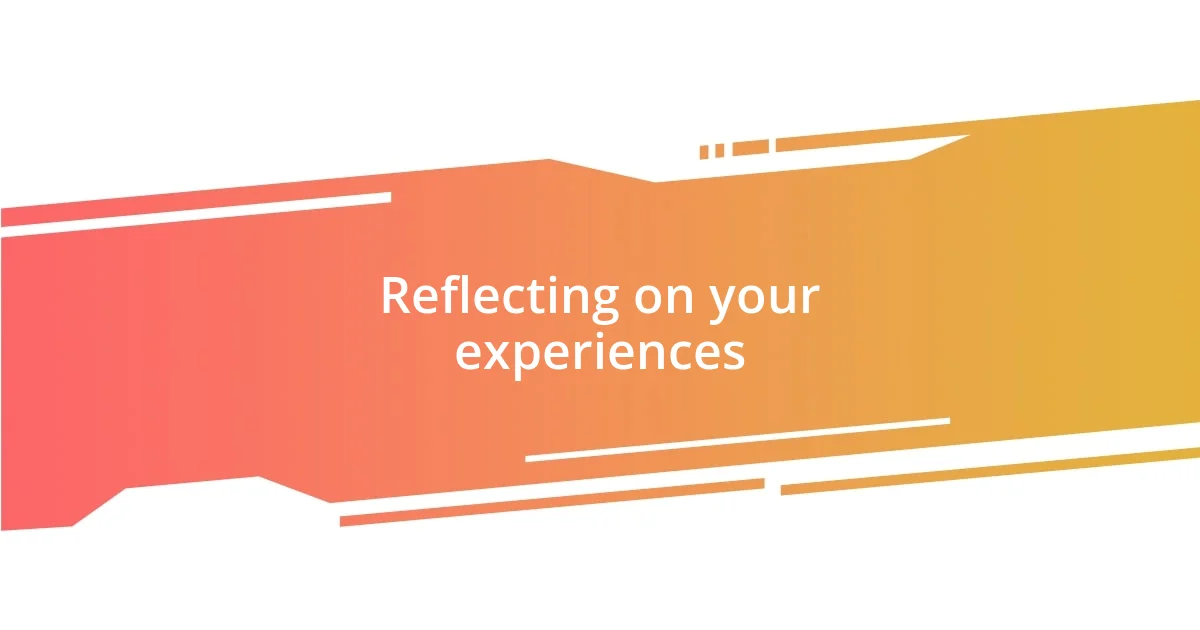
Reflecting on your experiences
Reflecting on my volunteering experiences has always been a game changer for me. There was a time when I rushed home after an intense day at a local shelter, mentally exhausted yet strangely fulfilled. I would find myself asking, “What did I learn today?” It dawned on me that taking a moment to pause and consider my thoughts not only solidified my learnings but also brought a sense of clarity to my overall journey.
Once, I participated in a tree-planting event that felt chaotic at first. Afterward, I sat on a nearby bench, staring at the saplings, and thought about my role in the community and the environment. I asked myself how I truly felt about the impact we made. Those reflections transformed my perception, highlighting the importance of every small action. It taught me that even a few minutes of contemplation can significantly deepen your connection to the cause, essentially elevating the experience from just a task to life-changing engagement.
I can’t emphasize enough how vital it is to articulate your feelings about your volunteer work. After volunteering at an art program for at-risk youth, I decided to write down my experiences. As I poured my thoughts onto the page, I was surprised by the depth of emotion I felt. It was a powerful moment that helped me understand the challenges the kids faced and the joy I had in their victories. Have you ever tried putting your feelings into words? It’s an exercise that reveals hidden insights and fosters a richer understanding of your experiences, ultimately making your volunteering journey even more rewarding.


